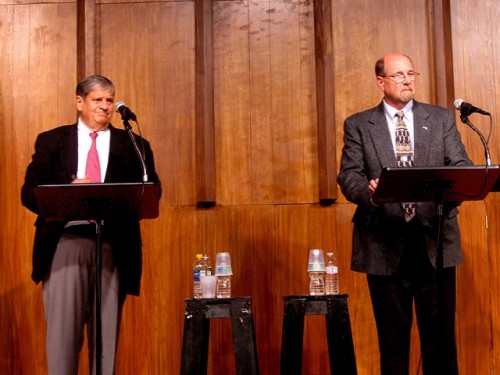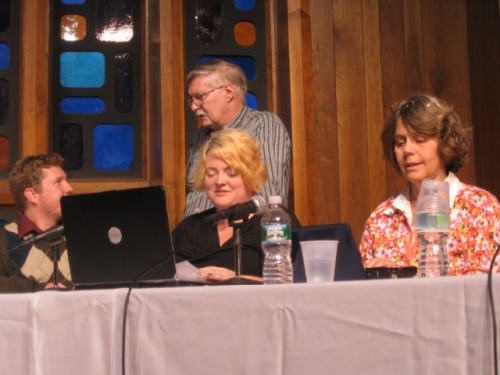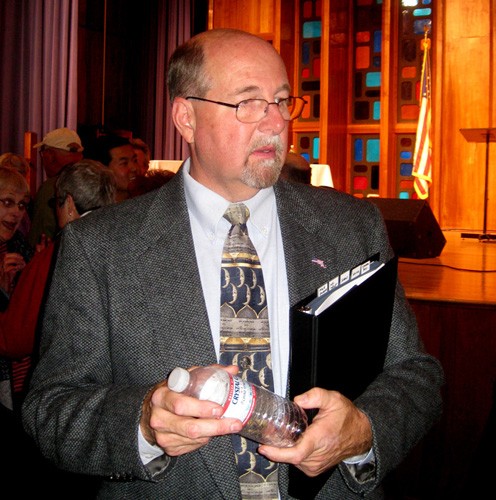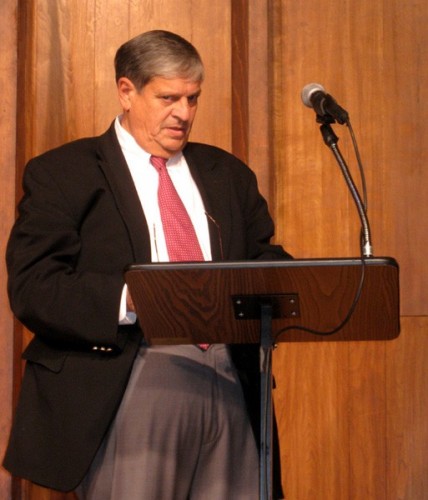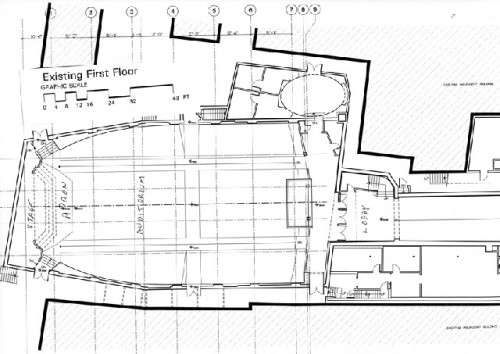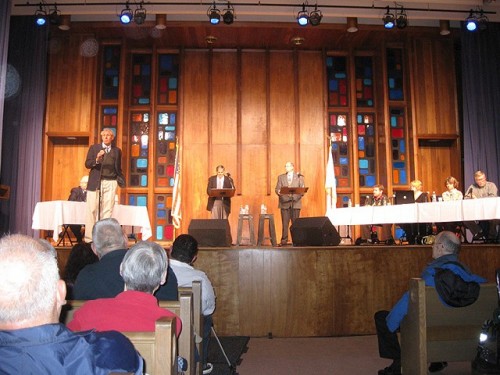Second North Adams Mayoral Debate a Tie
Most Answers Focus on Past and Present, Not Future
By: Larry Murray - Oct 15, 2009
Moderator Paul Hutchinson of Adams dispensed with lengthy introductions of the two Mayoral candidates at last night's second and last debate at the Church Street Center in North Adams. He said "Let's get right to the meat of it."
Instead we got mostly bread and butter issues. Crime. Old housing stock. Taxes. Schools. On these there was hardly a dime's worth of difference between the two candidates. Everyone's for low taxes, less crime, and better schools. Yawn.
The audience was expecting more. Waiting outside the hall before the debate, artist Phil Sellers talked about how North Adams could become the Cultural Capital of the Berkshires. "We have the foundation, all it would take is some imagination and daring" Sellers said. "So at this debate, I'd like to hear less about the past and a lot more about the future, and how we are going to get there."
Back when John Barrett first ran for Mayor in 1984, actress Clara Peller was lifting the top of her hamburger bun in TV commercials and asking "Where's the Beef?" Today, the same question might be asked of the two candidates.
The second debate was well covered, both by Tammy Daniels in iBerkshires and Jennifer Huberdeau of the North Adams Transcript. They also were on the panel that questioned the candidates. The debate is scheduled to be rebroadcast for the next several nights on the local access cable channel. iBerkshires will have links to videos as well. Two local radio stations, WNAW and WAMC, were also represented on the panel.
Each panelist was allowed two questions, followed by audience questions submitted on 3 x 5 cards. The format did not allow for follow up, so there was little real debate. The audience segment was more topics than questions, including an excellent one on preparations the city has made for a flu outbreak. Most generated lukewarm responses and mostly perfunctory applause. The debate was often limited to repeating dull, well rehearsed answers. Sometimes little surprises popped up, like the Mayor being unable to get the local trash haulers to do more with recycling.
Sometimes it was revealing what was not said. That neither cndidate has a real handle on what do do about the poor economy other than to cut costs and dream of new revenues.
Contender, Dick Alcombright, used his opening statement to outline the broad vision he has for the city. Mayor John Barrett put the vision thing aside and went into attack mode, preferring instead to introduce himself to the voters by repeatedly castigating Alcombright about his failure to ask questions when on the City Council. (More on the City Council candidates towards the end of this article.)
The Mayor was suffering from a cold at the last debate, and was much more his old self for this encounter. Speaking with City Council candidate Greg Roach beforehand, he predicted that it would be "A more combative debate where Barrett tries to put Dick on the spot."
Barrett poked and prodded his challenger, but Alcombright was not about to be bullied into a fight. He remained cool, calm, and on message. And that message seems to come down to this. With Barrett you will get more of the same governance the city has had for almost a quarter century, and with Alcombright, you will get more of the same, but with a new face, more meetings and input from the community.
Barrett noted his broad political connections which are important to keep state funding coming to the city. He also bragged that he has saved North Adams by building a cultural economy yet little of it seems to seep down to long time residents. Alcombright agrees that this arts and culture based approach continues to be a major answer to the city's problems. The voters, however, heard little about how this actually works to develop jobs. It's the missing link, and after two debates and numerous discussions, it is possible that neither of them really knows how to connect the dots.
Neither man has shown a very deep understanding of what a cultural economy can do. Barrett clings to its early concept born in the 1970s, one which has steadily morphed as time has gone on. To his credit, he made it possible for Mass MoCA to set up shop, and was a trailblazer for artists loft spaces when other towns and cities rejected the concept. Alcombright does not challenge this direction.
Future Jobs and Education
In my view, both candidates have a lot of catching up to do. Creative economies today are not just artistic, but technical as well. Creativity is the domain of inventors, architects, entrepreneurs and those who tinker, as well as, artists and performers. The rapid changes occurring in the job market are raising havoc with curriculums. Half the jobs that will be offered in 2012 do not exist today. A high school or college student needs to prepare for work in a different way than did our parents.
When talking about the schools, the debaters did not focus on this, but rather on the upcoming cuts to State aid for the cities and towns. Schools will be double challenged. Alcombright pointed to some of the city's reserve accounts that could be tapped to help fill the shortfall, like the Parking Fund. Barrett responded by saying he was already planning to use some of the reserve accounts to keep this year's tax rate lower.
Perhaps Barrett is looking at draining the reserves if Alcombright is his successor. Perhaps not. A lot can be read into this if you are so inclined. Unfortunately, there were no follow up questions allowed in this softball debate. The Transcript, who some claim is in Barrett's court, had the last word on who sat at the question table. North Adams has long needed a cantankerous Helen Thomas asking the tough questions and ruffling a few feathers.
A Changing Community
The current power structure of North Adams is pretty much a closed circuit. Not just artists, but the new people who have moved here - health and social service people, technical and retail entrepreneurs - have found that the information the city operates on is pretty much a closed loop.
The unhappiness about this has been building for years among the locals, as the most cursory glance at the Topix columns in the Transcript quickly reveals. Business as usual above. Pandemonium and a free-for-all below. That forum has acted as a bit of a safety valve for the pent up frustrations of many in the city, and with this campaign, it is now part of the mainstream election campaign.
The Alcombright campaign began as a group of disaffected North Adams old timers and long time residents, and it seems to have done the impossible. It has brought the old timers together with the newcomers, and shows signs of the two very different constituencies working together toward a common goal, the improvement of the job situation in the city. With more jobs and income, there is no question that an old mill town can work itself out of its decline. Both sides agree that this is the nub of the problem, and it needs a new look.
With more money in people's pockets comes more vibrant retail, long needed renovations to the housing stock, and, um, higher tax revenues. It's a no brainer. The old formula, created a decade or two ago, is in serious need of revision.. It must be done, not by one group or another at the helm, but by everyone in North Adams rowing in the same direction.
The Megaplex Problem
When the owners of the North Adams Megaplex wanted to include a video game arcade in their plans - similar to the one next to Regal Cinemas in Lanesboro - they were turned down flat. So the North Adams cinema opened with a long, empty, useless hallway where the video games were supposed to be.
With first run motion pictures taking 90% of the ticket gross, it was one of the few ways for such an operation to stay solvent. More importantly, recent studies have shown that teenagers are spending more time with video games and remote texting devices than watching television. A video game arcade is not the enemy. It is the future.
That the entrance walkway was allowed to lay fallow is one reason the complex was so uninviting. Maintenance was also an issue, with a noisy slamming door in one of the mini theatres that made watching a quiet movie torture. Dick Alcombright also pointed to the poor signage for both the theatre and the mall itself as part of the problem. Someone traveling on Route 8 "Wouldn't even know a shopping center was right there," he said.
The Mohawk Theatre
The Mohawk Theatre was only mentioned in passing at the debate, yet it remains the potential centerpiece of downtown renewal. Its future is bandied about with generalities, and has never been explained in a way that retailers and residents alike can grasp and support. In Barrett's mind it seems to be the restoration of the old building with no upgrading to meet the needs of the times.
Its future operation seems to destined, under his plan, to become another facility for MCLA and/or Mass MoCA. Indeed its talked about design, with movable seating, seems to be a rehash of the uncomfortable seating at the Hunter Center at MoCA. Its programming would be severely limited by a stage that averages only 5' deep behind the proscenium. There is barely enough room for a curtain, projection screen, and speakers.
Mass MoCA is limited in its ability to sponsor presentations by its nonprofit status which limits it to contemporary works, not polka bands, Baroque music, or the works of Main Street Stage. Similarly, the events likely to be sponsored by MCLA will be student productions and presentations that could be considered educational.
There was once a citywide group that grappled with these questions which are still in need of answers. There is no more perfect place for Alcombright to apply his "Engage the neighborhoods, engage the community, engage the cultural entities" than here. The way this is headed, the renovations will be done, the building will be turned over to an operator, who will then have to go back and retrofit it, at great expense, to make it suitable for the times. These are the vision "things" that will assure the end product meets the needs of the future, not the past.
Alcombright has stated that he will seek wider input for the Mohawk. Mayor Barrett should continue his quest for outside funding. He is sincere when he says he wants to rebuild this facility at little or no direct cost to the community. Down the road he wants at theater without debt, but even so, there will be a need for community support of such a facility.
Know Your Product - Make No Apologies
Mayor Barrett travels to other economically hard pressed cities to tell them how to get on the arts bandwagon. Yet locally, he still likes to say that he doesn't understand art, even takes pride in his ignorance. It took a long time to get him to stop saying he wouldn't walk across the street to see the art at Mass MoCA. One would think that after a quarter century he might have educated himself about art and culture. He needs to be better equipped to sell the city's major attributes. There are some people in North Adams who take pride in their lack of education. The Mayor should not be one of them. What kind of example does that set for students?
For his part, Dick Alcombright sees the creative economy as part of the future jobs picture, but has not connected the dots. The Mayoral hopeful will leave it to others to figure it out. Yet during the debate he did put his finger on a major problem in the city. He discussed under-educated, under-skilled workers who are adept at manufacturing jobs, hard working and reliable. They are mostly in their 40s and 50s and many are soon to begin collecting Social Security.
Part of the creative economy can be seen online, by the proliferation of small businesses that sell internationally through e-stores. These operations can be run from any city in the nation, why not North Adams? Why wait for the owners of this business to find us? As City Council candidate David Bond has proposed, the city's online website should be reconfigured as a selling tool for the city, one part of which could be directed at small independent businesses.
These small businesses often hire packers and shippers for their products. They often make simple, personalized items right on the premises. These are the kind of jobs our city needs.
Collaborative Government vs. Concentrated Power
During the debate, Alcombright returned again and again to the importance of being open to collaborative community ideas. Mayor Barrett claimed to be open to new ideas, but that seemed to be a debatable point.
After Barrett said he works with everyone, and is open to ideas, Alcombright responded: "I guess all we can say to that, Mayor, is if half the stories I hear are half true about people coming into your office with ideas, including me, then I don't feel as though people are well received in this community,"
Barrett appeared stunned by the vociferous applause that followed that charge.
In closing the Mayor once again attacked Alcombright and then painted a dark picture of stormy seas ahead for the city. His vision seemed to come down to this: "Not only is it going to be a difficult two years, it's going to be the most difficult two years in perhaps anytime in the history of this city,"
Alcombright instead focused on the upbeat. "I have a plan based on hundreds of conversations with you and I am asking for a chance to implement it."
City Council Race and Debate
The next and final round of North Adams debates will be between the 15 contestants for the City Council. This will take place next Wednesday night, October 21, at 7:00 PM at the American Legion hall.
The debate may turn on just how much the incumbents have done, and whether they are part of the problem. The world moves ever more swiftly, yet the pace of change in North Adams is glacial. Instead of being proactive, the current Council is seen as little more than a rubber stamp for the Mayor's ideas, rarely asking questions, challenging his decisions or carrying an initiative forward. Certainly the meetings in the City Council chambers have become so dull and lifeless that the local citizens and media rarely attend.
This is due to the City Council being largely a group of go-along-to-get-along folks who know better than to rock the boat. The incumbents are Alan Marden, Robert R. Moulton Jr., Lisa Blackmer, Gailanne Cariddi, Marie Harpin, Michael Bloom, and Ronald Boucher. You rarely read about them or their positions on city issues because they don't make waves. They play it safe. And they don't seem to do much to help bring in new jobs or business. They all serve on non controversial community and charity boards. Is this enough?
The challengers think not. Hoping to replace the established candidates are Brian L. Flagg, Michael S. Boland, Dennis J. Whitney, David A. Bond, Keith J. Bona, David A. Lamarre, Gregory B. Roach and Eric R. Buddington.
At least one new face will join the present body, and likely more. There is an impressive slate of candidates this year, and most have both fresh ideas and the energy to carry them out.
Some of the current members of the council are seriously behind the times in terms of technical and business knowledge. Two (Moulton, Harpin) do not even have email addresses on the city's website. This is an indicator of their inability to keep up with the times.
Some of the contenders, like Mike Boland, Greg Roach, and David Bond are far more savvy about how business and technology interact. They have a good shot at a Council seat. Says Roach: "I think Dan Bosley summed it up nicely the other day when he said that government always needs a mix of new and old to work efficiently and bring about innovation. The current council has only initiated a few things over the past several years that has not come directly from the mayor. That really needs to change."
There is even a fine arts person among the candidates, Keith Bona, who once specialized in abstract expressionist works. He makes his living doing branding, marketing, commercial art and architectural drawings. Bona has previously served on the City Council. He is just one of several contenders who know how to promote jobs and growth in a city. This is the finest, most qualified group of contenders we have had for the City Council in years.
In some ways, the City Council race is as important as the one for Mayor. Change doesn't just come from the corner office.
It should be an interesting City Council debate on October 21st. Stay tuned to Berkshire Fine Arts.
Larry Murray was once a County Committeeman in New York, and an alternate delegate from North Adams to the 2008 State Democratic Convention. He was chair of the Boston Midtown Cultural District Task Force from 1985-90 which replaced Boston's old combat zone with educational, cultural and residential development.

